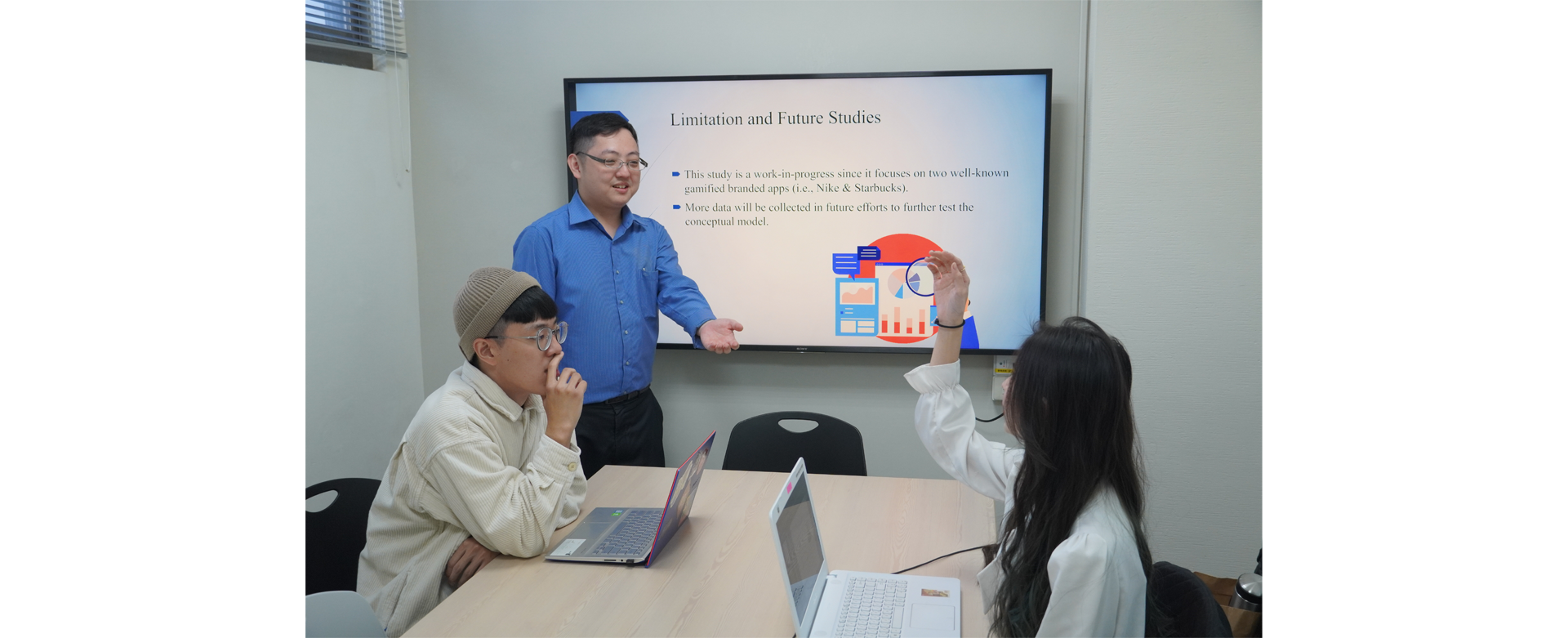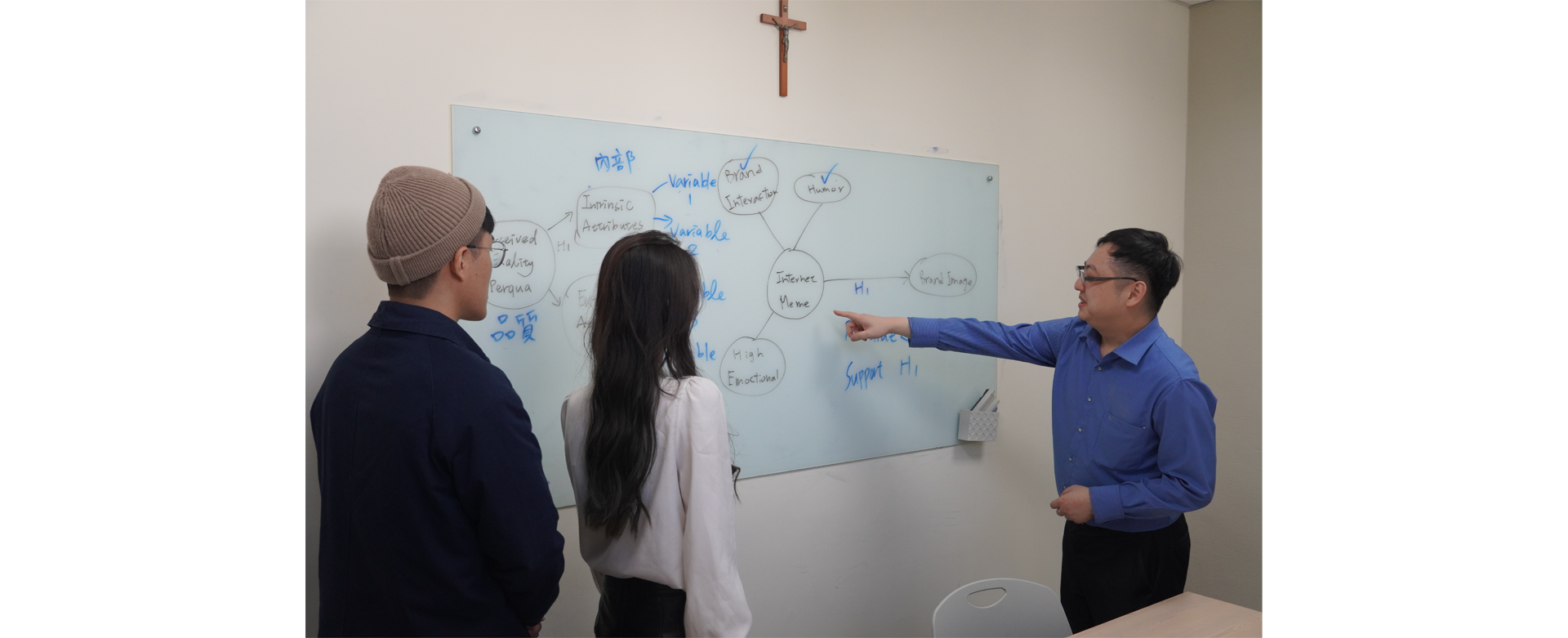Brand Experiences & Branded App Marketing
Brief Introduction
Timmy H. Tseng is an Associate Professor in the Department of Business Administration of Fu Jen Catholic University. He teaches courses related to digital marketing such as e-commerce & internet marketing and social media marketing and experiential marketing such as Agricultural Marketing Management. His research expertise has focused on brand experiences and branded apps and he has published many SSCI journal papers and obtained MOST projects on these topics.
Brand Experience Research
Professor Tseng has an enthusiasm for experiential marketing and loves reading books on experiential marketing, brand experiences, and customer experience management. He has published one influential paper related to experiential marketing in 2015 on European Journal of Marketing entitled “On the relationships among brand experience, hedonic emotions, and brand equity” which has hundreds of citations on Google Scholar. The paper empirically examines the effectiveness of five brand experiences (To Sense, To Feel, To Think, To Act, and To Relate) on brand equity and stresses the importance of staging holistic brand experiences to facilitate hedonic emotions and brand equity.
Branded App Research
With the advancement of mobile technology, smartphones are in the everyday lives of consumers. Seeing this trend, professor Tseng has shifted his research interest from offline experiential marketing to online experiences, especially branded app marketing. Professor Tseng has been dedicated to consumer behavior research of branded apps from 2018. He is one of the pioneers of branded app research stream. The low retention rate of customers and the fierce competition in app market have made the facilitation of consumer retention or branded app loyalty a research question of high practical relevance in the research stream of branded apps.
Under this research question, past studies have focused on the utilitarian perspective where perceived usefulness and perceived ease of use are two key drivers of branded app loyalty. Professor Tseng has contributed to branded app research by applying relationship theories to the context of branded apps and proposing a consumer-brand relationship perspective. He thought the utilitarian perspective while important is the basic condition or the first step for consumers to use a branded app. The establishment of consumer-brand relationships via branded apps is the key to consumer retention or branded app loyalty. His first paper on relationship perspective was published in 2018 on Telematics & Informatics entitled “Facilitation of consumer loyalty toward branded applications: The dual-route perspective”. Parasocial interaction theory is the key theoretical foundation where symbolic benefits and experiential benefits are more effective than functional benefits and economic benefits on facilitating parasocial interactions between consumers and the focal brand, which in turn generates branded app loyalty. Later, professor Tseng has extended the research in 2018 to generate a series of follow-up studies. One study published in 2021 on Marketing Intelligence & Planning entitled “How gamified branded applications drive marketing effectiveness?” extends the experiential benefits and examines the facilitation of marketing effectiveness of gamified branded applications. Related, another study published in the same year on Journal of Retailing and Consumer Services entitled “Branded app atmospherics: examining the effect of pleasure–arousal–dominance in brand relationship building” also focuses on the experiential benefits and investigates the emotional power of app atmospherics to facilitate consumer loyalty. Another study published in the same year on Journal of Product & Brand Management entitled “Facilitation of “strong” branded application outcomes–the self-concept perspective” extends the symbolic benefits and investigates the facilitation of stronger positive outcomes from the self-concept perspective. Another study published in the same year on International Journal of Retail & Distribution Management entitled “Success factors driving consumer reuse intention of mobile shopping application channel” extends the economic benefits and parasocial interactions and examines the effects of different forms of promotional benefits and parasocial interactions on perceived value and user satisfaction, which in turn generates reuse intention. With so much extensions on 2018’s study, Professor Tseng has begun to utilize different theories of interpersonal relations to explain branded app loyalty. He has online published one paper in 2021 on Internet Research entitled “Capturing behavioural outcomes through branded applications: the perspective of the investment model” where the investment model of interpersonal relations is used as a key theoretical foundation, which is integrated with app relational benefits. In the future, Professor Tseng will keep working on the field of branded app marketing to use different theoretical lens to examine topics such as branded app embeddedness and branded app attraction model.
MOST Project and Research Team
| Year | Project Topic | Role | Duration |
| 2020 | Why consumers stay: Using branded app embeddedness to predict branded app loyalty and app deleting intention (MOST 109-2410-H-030-038-MY2) | Host | 2020.08.01 to 2022.07.31 |
| 2020 | Increasing internet entrepreneurial self-efficacy among college students: effective course characteristics (MOST 109-2511-H-030-002 MY2) | Host | 2020.08.01 to 2022.07.31 |
| 2019 | Examining Antecedents of Branded Application Loyalty from the Perspective of Investment Model (MOST 108-2410-H-030-080-) | Host |
2019.08.01 to 2020.07.31 |
| 2018 | Investigating the effects of design factors on the marketing effectiveness of gamified branded applications (MOST 107-2410-H-030-083-) | Host | 2018.10.01 to 2019.09.30 |
Professor Tseng has worked on many MOST projects. The topic is mainly on branded apps such as the gamified branded app in 2018, the perspective of investment model in 2019, and the embeddedness perspective of branded apps in 2020. He has decided to enter the field of business education especially internet entrepreneurship education on 2020. He wants to know how to improve the design of e-commerce & internet marketing courses to enhance knowledge and skills of university students on internet entrepreneurship and then increase their intention to start their online businesses. This can bring prosperity to the economy of Taiwan.
Professor Tseng’s research team is composed of undergraduate and graduate students in Fu Jen Catholic University. Professor Tseng treats these students like friends and teach them knowledge and skills of conducting a research during the research process. Other than the domain knowledge of branded apps and internet entrepreneurship, students can learn how to conduct a better literature review, research design, statistical analyses, and report presentation. He encourages students to participate in academic conferences and write SSCI journal papers to share their research findings with people interested on the globe. He also encourages undergraduate students to apply for MOST project. Being like a Home and sharing knowledge and growing together are what typifies Professor Tseng’s research team.
SSCI Journal Publications on Experiential Marketing and Branded Apps
Ding, C. G., & Tseng, T. H. (2015). On the relationships among brand experience, hedonic emotions, and brand equity. European Journal of Marketing, 49(7-8), 994-1015.
Tseng, T. H., & Lee, C. T. (2018). Facilitation of consumer loyalty toward branded applications: The dual-route perspective. Telematics and Informatics, 35(5), 1297-1309.
Hsieh, S. H., Lee, C. T., & Tseng, T. H. (2021). Branded app atmospherics: examining the effect of pleasure–arousal–dominance in brand relationship building. Journal of Retailing and Consumer Services, 60, 102482.
Tseng, T. H. (2021). Facilitation of “strong” branded application outcomes–the self-concept perspective. Journal of Product and Brand Management, 30(7), 976-989.
Tseng, T. H., Hsieh, S. H., & Lee, C. T. (2021a). How gamified branded applications drive marketing effectiveness?. Marketing Intelligence & Planning, 39(5), 633-648.
Tseng, T. H., Hsieh, S. H., & Lee, C. T. (2021b). Capturing behavioural outcomes through branded applications: the perspective of the investment model. Internet Research. https://doi.org/10.1108/INTR-08-2020-0452
Tseng, T. H., Lee, C. T., Huang, H. T., & Yang, W. H. (2021c). Success factors driving consumer reuse intention of mobile shopping application channel. International Journal of Retail & Distribution Management, 50(1), 76-99.
314 views


